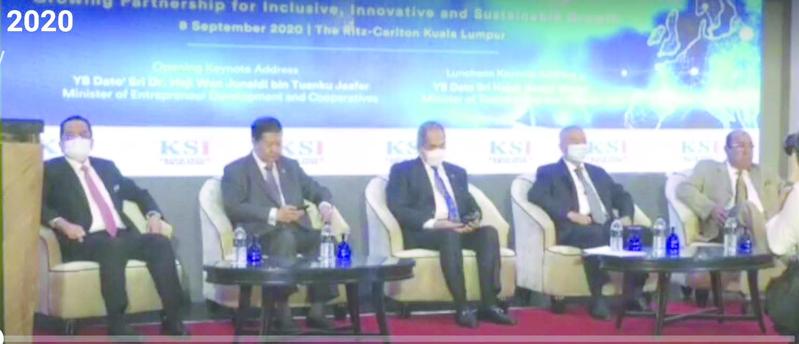 A video grab of the opening ceremony of the 2020 Asia Economic and Entrepreneurship Summit on Sept 8 in Kuala Lumpur. (PHOTO / CHINA DAILY)
A video grab of the opening ceremony of the 2020 Asia Economic and Entrepreneurship Summit on Sept 8 in Kuala Lumpur. (PHOTO / CHINA DAILY)
Increased cross-border cooperation and enhanced public-private partnership will help Asian economies to recover from the pandemic hit and innovate in new normal, according to speakers at a webinar based in Kuala Lumpur.
Other panelists at the morning session noted China is driving regional growth by continuing to open up its economies and promoting its private businesses and market circulation
In the unusual era of risks and opportunities, varied economies in Asia could enhance regional dialogues and strengthen economic recovery, environmental protection, employment and education, Tan Sri Michael Yeoh, president of KSI Strategic Institute for Asia Pacific, told the Asia Economic and Entrepreneurship Summit on Sept 8.
READ MORE: Netflix tools up in SE Asia as streaming battle heats up
The opening ceremony and panel discussions at the summit, hosted by KSI with a number of partners including China Daily, address growing partnership for inclusive, innovative and sustainable growth in the Asia Pacific.
“Asian Pacific economies can learn from one another and share their experiences” to adapt to the new normal during and after the COVID-19 pandemic and transform, President Tan Sri Michael Yeoh said.
Datuk Seri Dr Wan Junaidi Tuanku Jaafar, Malaysian Minister of Entrepreneur Development and Cooperatives, in his keynote speech at the opening ceremony, injected hope by mapping out the country’s plan and path out of the crisis.
The pandemic hit small and medium-sized businesses hard and brought about 58 percent of those businesses no sale at all for March and April.
“To initiate another way of doing business is the key word of the government,” the minister told the participants both at the venue in the capital city and online. Currently a three-R approach, meaning relief, recovery and reform, is gaining momentum.
The Malaysian authorities have provided assistance to SMEs in cash flow and give them breathing space. Over the past months employment is increasing, industrial productivity recovering, and retail sales and wholesales are growing, though more needs to be done to make up the earlier setback.
However, “life will never be the same again,” he said. And the authorities are working together with local agencies and private businesses as well foreign partners to promote more local businesses, train local youths, seek solutions to empower others for innovation, increased production and wealth creation.
The momentum can be carried along with Malaysia’s 2021-25 plan for social and economic progress, he said.
Apart from existing global chain supplies, local Malaysian companies are teaming up with businesses from elsewhere including China on digital transformation as well.
Michael Walsh, Chief Executive of Pacific Basin Economic Council, said at the ceremony that e-commerce can help adapt local businesses to the changes. He sees ASEAN emerging stronger from the crisis for sustainable growth.
He noted that at a time when employment is at an urgent point, education and entrepreneurship come to the core for revival with environmental awareness.
President Tan Sri Michael Yeoh reminded business and entrepreneurs for opportunities in startups and digital operations, online education, food supply and delivery among others.
Afternoon sessions are discussing sustainable development goals, regional security, and digital Asia Pacific among other issues
Dr Edon Woon, president, Asian Institute of Technology from Thailand, said higher education in Asia should be optimistic about their prospects as more talented students are choosing universities in the own region instead of going to Western nations while many in the Western institutions are returning home.
Besides, he is looking forward to more intra-regional cooperation, especially what he calls complementary collaboration.
Asia is a formidable economic region, with China taking the lead and ASEAN, India and Japan picking up, he said.
ALSO READ: Potsdam Conference venue focuses on China, Asia theater of war
Other panelists at the morning session noted China is driving regional growth by continuing to open up its economies and promoting its private businesses and market circulation. The duel circulations of domestic and international economies adopted recently by Beijing, with emphasis on the former, are creating more opportunities for businesses across the Asia Pacific.
Afternoon sessions are discussing sustainable development goals, regional security, and digital Asia Pacific among other issues.


